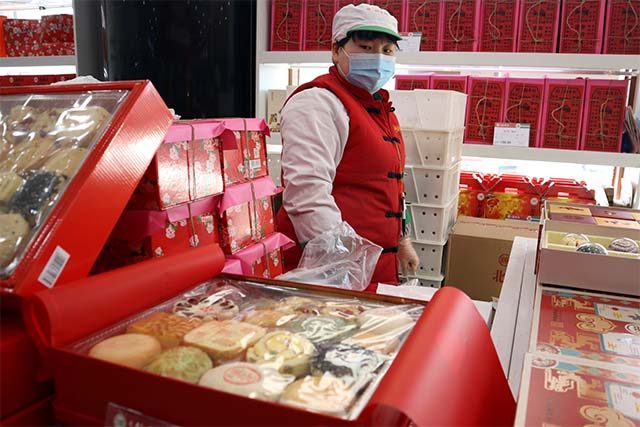
SHANGHAI — Chinese unable to re-unite with loved ones this Lunar New Year are sending them a taste of home instead, using food packages to bridge the distance, as coronavirus warnings in some regions put a stop to the usual lengthy journeys home.
Beijing resident Wang Hui has received homemade dried beef, fried rabbit, spicy tofu and smoked pork that his mother bought online for him after he decided not to visit his southwestern home city of Chongqing.
“In her eyes, I’m always short of food,” said Wang, 27, who works for an internet firm. “The new year holiday is such a special time that she must make sure I have food I love – that is, home food.”
The surge in such small comforts for separated families will help consumption in China’s economy, where a hoped-for-recovery in spending on services such as restaurants and hotels has been dealt a blow by the disappointing travel season.
E-commerce and online sites have benefited as sales of food surged 40% during a shopping festival from Jan. 20 to Feb 3, versus the last Lunar New Year period, state broadcaster CCTV says.
The Lunar New Year, which starts on Friday, is ordinarily the world’s biggest annual migration, when hundreds of millions of China’s migrant workers return to home towns, but travel warnings over virus risks have deterred many this year.
China has discouraged holiday travel after recent outbreaks forced widespread testing and quarantine requirements, despite earlier success in reining in the 2019 outbreak that also disrupted last year‘s Lunar New Year festivities.
The transport ministry has estimated passenger trips will fall 40% during the 40-day spring travel season from the pre-pandemic levels of 2019.
For the first time in nearly two months, China had reported no new local infections by Sunday, a sign that aggressive measures have limited their spread. Mainland China’s tally of infections stands at 89,706, with deaths at 4,636.
‘Willing to splurge’
Food and beverage orders have spiked ahead of this year‘s holiday, say e-commerce and retail sites such as JD.Com, Pinduoduo and JD Daojia, with JD.com flagging a surge in items between major cities and smaller regions.
“After a difficult year due to the pandemic, people will likely be willing to splurge on food items as a comfort and a reward,” said Imogen Page-Jarrett, an analyst with the Economist Intelligence Unit.
“Consumers will see it as essential to send gifts, including food, to their relatives, even if they cannot return in person.”
City workers are sending items of local cuisine and staples such as rice and cooking oil to families, while parents send hometown delicacies to children in the city.
“Not going home for New Year‘s, my parents sent ‘Spring Festival’ goods,” has become a trending topic on Weibo, China’s equivalent of Twitter.
Beijing has become the top destination for food ordered in remote areas.
Delicacies range from West Lake lotus root starch from the city of Hangzhou and red sausage from northeastern Harbin to hot-pot ingredients from southwestern Sichuan and Chaoshan handmade beef balls from southern Guangdong, says JD.com.
“It is clear that family members far away also want to let their children in the big cities know they are thinking about them,” the platform posted.
Producers of local delicacies are cashing in on the demand, with New Year online sales of Beijing brands, such as Daoxiangcun bakery goods and Wuyutai tea, up 135% and 500% respectively on the year, state media say.
In the central city of Changsha, one social media user displayed pictures of the Daoxiangcun baked goods sent by her mother, adding, “My mum is still happy, despite my not returning home, saying that distance creates beauty.”
—Reporting by Emily Chow in Shanghai and Sophie Yu in Beijing, additional reporting by Beijing newsroom; Editing by Shivani Singh and Clarence Fernandez









